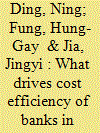| Srl | Item |
| 1 |
ID:
149960


|
|
|
|
|
| Summary/Abstract |
Energy crops production is considered as environmentally benign and socially acceptable, offering ecological benefits over fossil fuels through their contribution to the reduction of greenhouse gases and acidifying emissions. Energy crops are subjected to persistent policy support by the EU, despite their limited or even marginally negative impact on the greenhouse effect. The present study endeavors to optimize the agricultural income generated by energy crops in a remote and disadvantageous region, with the assistance of linear programming. The optimization concerns the income created from soybean, sunflower (proxy for energy crop), and corn. Different policy scenarios imposed restrictions on the value of the subsidies as a proxy for EU policy tools, the value of inputs (costs of capital and labor) and different irrigation conditions. The results indicate that the area and the imports per energy crop remain unchanged, independently of the policy scenario enacted. Furthermore, corn cultivation contributes the most to iFncome maximization, whereas the implemented CAP policy plays an incremental role in uptaking an energy crop. A key implication is that alternative forms of motivation should be provided to the farmers beyond the financial ones in order the extensive use of energy crops to be achieved.
|
|
|
|
|
|
|
|
|
|
|
|
|
|
|
|
| 2 |
ID:
138106


|
|
|
|
|
| Summary/Abstract |
This study uses stochastic frontier analysis to examine the factors that influenced cost efficiency of banks in China from 2005 to 2013. The results indicate that policy variables, such as the reserve requirement ratio, the interest rate spread and open market operations by the People's Bank of China, are effective in improving the cost efficiency of banks, but shadow banking variables may reduce cost efficiency. Among the various bank types, city commercial banks appear to be the most efficient and foreign banks are the least efficient. The present study suggests that policy-makers can have a positive influence on bank cost efficiency by adjusting macro policy variables on different types of banks and by requiring more information on the shadow banking activities to improve monitoring.
|
|
|
|
|
|
|
|
|
|
|
|
|
|
|
|